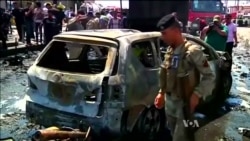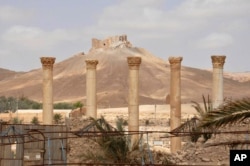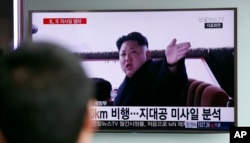Regional security issues will be a focal point for Secretary of State John Kerry, who travels to the Middle East and Asia Pacific this week.
The multi-national effort to defeat Islamic State (IS) militants in Iraq and Syria will be among topics discussed during Kerry’s first stop in Bahrain, where he will participate in a ministerial meeting of the six-nation Gulf Cooperation Council.
On Monday ahead of the trip, Kerry said the multi-national coalition had made progress in the fight against Islamic State but there was still work to do.
“There are still great hurdles ahead of us, and the fight - as we have seen in Brussels and Paris and Ankara and elsewhere – it continues to pose a threat,” said Kerry during an appearance with Austrian Foreign Minister Sebastian Kurz.
There has been mixed progress in efforts to defeat IS in Iraq.
The Iraqi army and pro-government militias have inched closer to re-taking the northern city of Mosul, which has been under IS control.
However, the militant group has continued to wage a bloody battle against the government, including a string of attacks on Monday that left more than two dozen people dead.
Iraq’s ongoing challenges to achieve political stability could also hamper efforts to defeat IS, say analysts.
“The thing that is critical to remember about the fight against ISIS in Iraq is the fact that the military component of the battle is just one portion of it,” said Jessica Ashooh, deputy director of the Middle East Strategy Task Force at the Atlantic Council.
“The long-term issue that needs to be addressed is, of course, the political challenges that Iraq still faces,” she said.
In Syria, the Russian-backed Syrian regime recently drove Islamic State militants out of the historical city of Palmyra.
However, a fragile cessation of hostilities between the government and the opposition is showing sides of fray in the wake of fierce fighting between the two sides over the past few days.
Human rights and relief groups have complained that the Syrian government has not been living up to a pledge to allow unhindered humanitarian aid deliveries to besieged parts of the country.
Both the cease-fire and the increased access for aid groups are part of a broader U.N.-facilitated plan to bring out a political transition in Syria.
Yemen Peace Talks on Horizon
Kerry and Gulf leaders are also expected to discuss the situation in Yemen. U.N.-sponsored peace talks are due to start in Kuwait this month.
The U.S. has been backing a Saudi-led military coalition that has been carrying out airstrikes against Houthi rebels in Yemen in support of the government of internationally recognized President Abd Rabbo Mansour Hadi.
Global Terror Threat, Pyongyang, Likely Focal Points in Japan
Later in the week, Kerry travels to Hiroshima, Japan for a G-7 (group of seven industrialized nations) ministerial meeting that will set the stage for President Barack Obama’s May trip to Japan for a G-7 summit.
With four European nations represented in the G-7, a likely focal point will be multi-national efforts to combat terrorism in the wake of recent Islamic State-linked attacks in Brussels and Paris.
North Korea is also likely to be on the agenda, said Richard Bush, director of the Center for East Asia Policy Studies at the Brookings Institution.
Pyongyang recently carried out a string of nuclear and ballistic missile tests, in spite of U.N. sanctions, and has continued to aim provocative language at the U.S. and South Korea.
“I think North Korea will make the list because the meeting is being held in Japan, and Japan is one of the countries that is most threatened by North Korea’s capabilities,” said Bush.
During the trip, Kerry and other foreign ministers will visit the Peace Memorial Park. The park is dedicated to the victims of the 1945 U.S. atomic bombing in Hiroshima.







